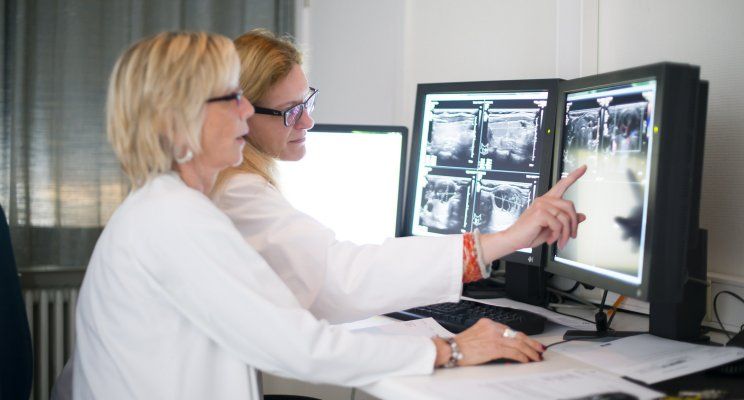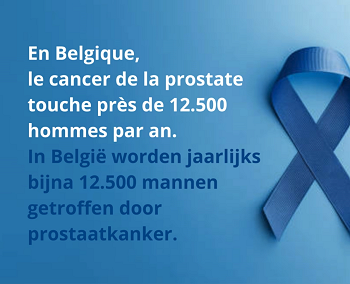
The prostate is a gland that is a part of the male genital system, located beneath the bladder and surrounding the urethra. In young men it is the size of a walnut but it can increase in volume with age. The prostate produces prostatic fluid that is a constituent of sperm and helps nourish and protect the spermatozoids.
Prostate cancer develops in the prostate cells that increase in number and divide randomly to form a tumour. This tumour can be benign or malignant. If malignant it has the potential to propagate to other parts of the body, forming metastases. Prostate cancer often develops slowly, sometimes taking several years before producing symptoms.
In 2023, prostate cancer was the most common male cancer in Belgium, with approximately 12 700 new cases diagnosed and 1 600 associated deaths. If caught early, the survival rate after five years for prostate cancer is 98%.
At the Jules Bordet Institute – Brussels University Hospital (H.U.B), prostate cancer is treated at the Willy Grégoir Prostate Cancer Centre. As part of a multidisciplinary approach centred on the individual patient, at this unique reference centre in Belgium experts of national and international renown work closely together to provide personalised and innovative treatment.
Prostate cancer is often asymptomatic in its early stages. The first symptoms include urinary disorders such as a frequent desire to urinate, difficulty in urinating, a feeling of not having emptied the bladder and sometimes blood in the sperm or urine. At an advanced stage, pelvic, back or bone pain may appear as well as erectile function disorders and unexplained weight loss.
The principal risk factors for prostate cancers include :
- Age: Most cases appear in men aged over 65.
- Family history: There is an increased risk in the case of a family history of prostate cancer, especially if several family members have been affected.
- Ethnic origin: Men of African or Afro-Caribbean origin are at increased risk.
- Genetic mutations: Some mutations, in particular of the BRCA1 and BRCA2 genes, or of the MLH1 and MLH2 genes (Lynch syndrome), increase the risk.
- Professional exposure: Exposure to certain pesticides and chemical products in a professional context are believed to be a risk factor (e.g. farmers and firemen).
- Diet and obesity: Obesity, eating too many dairy products rich in calcium and a vitamin E and selenium deficiency increase the risk, although proof remains limited and controversial.
It is important to note that no specific preventive measure is currently recommended to reduce the risk of prostate cancer. However, adopting a healthy and balanced diet, regular physical activity and not smoking are all positive factors that are recognised for their many health benefits.
To find out more about nutrition and cancer
A number of stages are involved in reaching a prostate cancer diagnosis.
Experts on each of these diagnostic stages work together at the Jules Bordet Institute – H.U.B, Willy Grégoir Prostate Cancer Centre.
Screening
Although its effectiveness in reducing mortality associated with prostate cancer remains controversial, scientific societies recommend screening for men aged over 50 after discussing the advantages and disadvantages. Screening is proposed from the age of 45 for men of African origin or who have a family history of prostate cancer, and from the age of 40 in the case of genetic predispositions.
There are two principal screening tests:
PSA (prostate-specific antigen) tests
A blood test makes it possible to measure the level of PSA in the blood. This is a protein produced by the prostate and a high level can be a sign of cancer but also of other benign conditions such as hyperplasia or an inflamed prostate.
A digital rectal examination
A clinical examination carried out by a doctor to evaluate the site and consistency of the prostate. Using a gloved finger the doctor palpates the prostate that rests on the rectum.
These examinations enable any anomalies (high PSA and /or suspect digital rectum examination) to be detected that may require further investigation, even in the absence of symptoms.
Discover the cancer prevention and screening clinic
The diagnostic analysis
If screening reveals any anomaly, further examinations are carried out to confirm or exclude a cancer.
Here are the additional examinations we propose:
Multiparametric Magnetic Resonance Imaging (MRI) of the prostate
This imaging uses a powerful magnetic field, of 3.0 Tesla, to localise and evaluate the seriousness of any suspect lesions in the prostate.
Find out more Multiparametric MRI of the prostate
Prostate biopsies
Using ultrasound guiding and MRI, samples of the prostate are taken through the perineum for subsequent analysis of the tissue under the microscope. These biopsies confirm the presence of cancer cells and determine their aggressiveness with reference to the Gleason score (or ISUP grade).
Find out more : Prostate biospy
Extension assessment
Once the cancer diagnosis is confirmed further examinations are carried out to assess any possible spread of the cancer outside the prostate. These examinations are adapted to the individual patient and are discussed with your doctor.
Here are the further examinations we suggest:
Position emission tomography (PET)
This nuclear medicine imaging coupled with a scan (PET-CT) or MRI (PET-MRI) makes it possible to detect cancerous lesions and metastases with increased precision by using a tracer specific to the cancer, the PSMA (Prostate Specific Membrane Antigen).
Find out more : Positron Emission Tomography with PSMA as biomarker (PSMA PET)
Bone scintigraphy or whole body bone scan
These examinations are sometimes necessary to search for any metastases.
These combined stages make it possible to give a precise diagnosis and determine the aggressiveness (grade) and extent (stage) of the disease as a basis for treatment decisions that are discussed collegially.
A number of factors determine treatment, including the specific characteristics of the cancer and the age and general health of the patient. The cancer is classed in one of three categories depending on its progression:
- Localised: the cancer is limited to the prostate.
- Locally advanced: the cancer has spread beyond the prostate, possibly affecting the neighbouring lymph nodes.
Metastatic: the cancer has spread to other parts of the body
For each category, a number of treatment options are available, either singly or in combination, and these will be proposed following a discussion at a Multidisciplinary Oncological Consultation (MOC) with the team from the Willy Grégoir Prostate Cancer Centre.
To find out more about treatment of urological cancers
Here are the treatments we propose for localised cancers (and locally advanced cancers):
- Active surveillance
For locally advanced low risk cancers regular surveillance can be envisaged. This treatment consists of close monitoring without immediate treatment with regular digital rectal examinations, a multiparametric MRI of the prostate and biopsies.
To find out more : Active surveillance
- Surgery (robot-assisted radical prostatectomy)
A radical prostatectomy is the complete surgical removal of the prostate and seminal vesicles. We carry this out using robot-assisted methods only. This option is often chosen for localised or locally advanced cancers
Discover the H.U.B’s Robotic Surgery Clinic
To find out more : Radical prostatectomy
- Radiotherapy
Radiotherapy uses radiation to destroy the cancer cells. It is often used for localised or locally advanced cancers, sometimes after a radical prostatectomy. There are two ways of administering it:- External radiotherapy
The radiation is directed at the prostate using an external machine in between 5 and 35 sessions using the MRI-Linac.
Find out more : External Beam Radiation Therapy (EBRT)
- Brachytherapy
Radioactive implants are placed directly in the prostate to deliver a localised dose of radiation.
Find out more : Brachytherapy treatment
- External radiotherapy
- Focal therapy
Focal therapy aims to treat the tumour zone only, preserving the rest of the prostate and reducing side effects. It is used principally for localised cancers of low or intermediate risk. Its use remains controversial due to the absence of data on the long-term effects. The options include:- HIFU (High Intensity Focused Ultrasound)
An endorectal probe emits ultrasounds causing an increase in temperature that destroys the tumour mass.
Find out more : Focal therapy using HIFU - TMA (Targeted Microwave Ablation)
An antenna inserted into the tumour emits microwaves causing an increase in temperature that destroys the tumour tissue
Find out more : Focal therapy by microwave ablation (TMA)
- HIFU (High Intensity Focused Ultrasound)
Here is the treatment we propose for metastatic cancers:
- Hormone therapy
Hormone therapy seeks to reduce or block the action of androgens, principally testosterone, which stimulate the growth of the cancer cells. This can be achieved with drugs or surgery (pulpectomy). - Chemotherapy
Chemotherapy uses cytoxic drugs, such as docetaxel or cabazitaxel, to destroy the cancer cells.
- Radiotherapy
Radiotherapy uses radiation to destroy the cancer cells, either by targeting the prostate or the metastases. It also serves to relieve the pain of the metastases. - Radiopharmaceuticals
This treatment, like Radium-223 or Lutétium-177-PSMA, uses radioactive isotopes to target the cancer cells. These deliver localised radiation aimed at the metastases.
Find out more : Theranostic treatment - Targeted therapy
PARP inhibitors act on the specific genetic anomalies of the cancer cells, such as BRCA1/BRCA2 mutations.
- Supporting care
This treatment is intended to improve the quality of life of patients by averting or treating bone complications, using biphosphonates or denosumab for example, and managing symptoms such as pain or fatigue.
Access our page : Supporting care
After treating the prostate cancer regular medical follow-up is essential to monitor the development of the disease and detect any recurrence. This follow-up is in the form of regular consultations and tests, notably measurement of PSA levels to monitor the presence of any residual cancer cells. Depending on the treatment received (surgery, radiotherapy, focal treatment, etc.), further examinations, such as medical imaging, can be carried out to check for the possible presence of a local return of the cancer or metastases.
Post-treatment recovery varies depending on the type of treatment received. Some patients may experience urinary problems, erectile dysfunction or persistent tiredness that can result from the treatment side effects. These can decrease over time and with appropriate care, including medical treatment and rehabilitation sessions. It is essential for patients to discuss any issues openly with their medical team to find the appropriate solutions and improve their quality of life following treatment.
To find out more about post-cancer care
The notion of remission is commonly used in post-treatment follow-up, designating a period when the cancer is no longer detected and signs of the disease are absent. However, it is important to understand that remission does not necessarily mean a cure. Prostate cancer can sometimes return several years after treatment, hence the justification for long-term follow-up. A full recovery is often difficult to define, but a prolonged remission without any sign of the cancer returning can be an indicator of a cure in certain cases.

Click on the image or click here to start the video